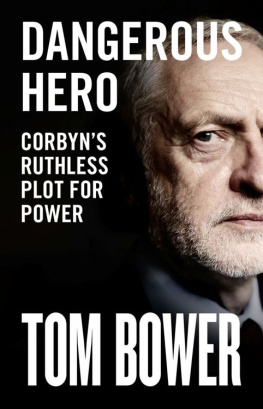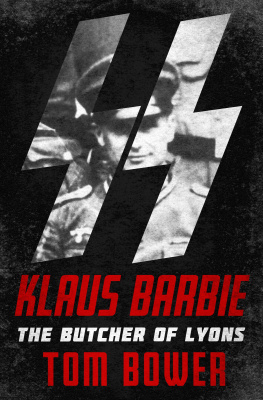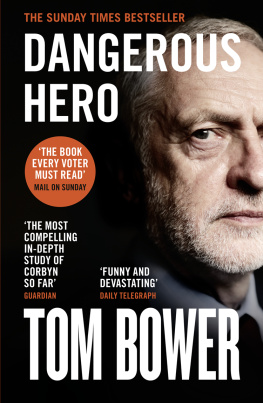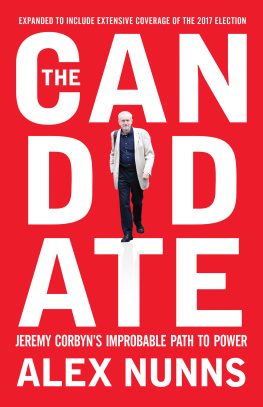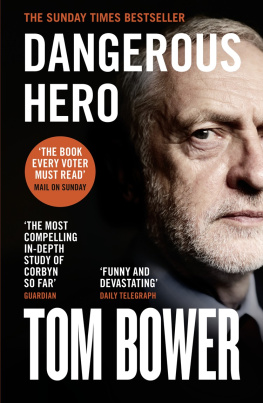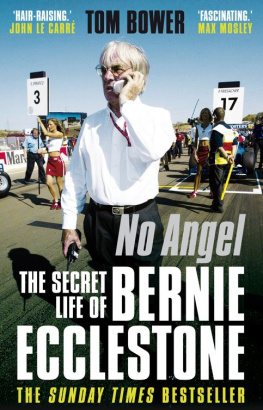Bower Tom - Dangerous hero: Corbyns ruthless plot for power
Here you can read online Bower Tom - Dangerous hero: Corbyns ruthless plot for power full text of the book (entire story) in english for free. Download pdf and epub, get meaning, cover and reviews about this ebook. City: London, year: 2019, publisher: HarperCollins Publishers;William Collins, genre: Non-fiction. Description of the work, (preface) as well as reviews are available. Best literature library LitArk.com created for fans of good reading and offers a wide selection of genres:
Romance novel
Science fiction
Adventure
Detective
Science
History
Home and family
Prose
Art
Politics
Computer
Non-fiction
Religion
Business
Children
Humor
Choose a favorite category and find really read worthwhile books. Enjoy immersion in the world of imagination, feel the emotions of the characters or learn something new for yourself, make an fascinating discovery.
- Book:Dangerous hero: Corbyns ruthless plot for power
- Author:
- Publisher:HarperCollins Publishers;William Collins
- Genre:
- Year:2019
- City:London
- Rating:4 / 5
- Favourites:Add to favourites
- Your mark:
- 80
- 1
- 2
- 3
- 4
- 5
Dangerous hero: Corbyns ruthless plot for power: summary, description and annotation
We offer to read an annotation, description, summary or preface (depends on what the author of the book "Dangerous hero: Corbyns ruthless plot for power" wrote himself). If you haven't found the necessary information about the book — write in the comments, we will try to find it.
Dangerous hero: Corbyns ruthless plot for power — read online for free the complete book (whole text) full work
Below is the text of the book, divided by pages. System saving the place of the last page read, allows you to conveniently read the book "Dangerous hero: Corbyns ruthless plot for power" online for free, without having to search again every time where you left off. Put a bookmark, and you can go to the page where you finished reading at any time.
Font size:
Interval:
Bookmark:
William Collins
An imprint of HarperCollinsPublishers
1 London Bridge Street London SE1 9GF
www.WilliamCollinsBooks.com
This eBook first published in Great Britain by William Collins in 2019
Copyright Tom Bower 2019
Cover image Getty Images Tom Bower asserts the moral right to be identified as the author of this work A catalogue record for this book is available from the British Library The publishers have made every effort to credit the copyright holders of the material used in this book. If we have incorrectly credited your copyright material please contact us for correction in future editions.
All rights reserved under International and Pan-American Copyright Conventions. By payment of the required fees, you have been granted the non-exclusive, non-transferable right to access and read the text of this e-book on screen. No part of this text may be reproduced, transmitted, down-loaded, decompiled, reverse engineered, or stored in or introduced into any information storage and retrieval system, in any form or by any means, whether electronic or mechanical, now known or hereinafter invented, without the express written permission of HarperCollins.
Source ISBN: 9780008299576
Ebook Edition February 2019 ISBN: 9780008299590
Version: 2019-03-06
To Veronica
The genesis of this book started exactly fifty years ago.
At the end of January 1969, a group of Marxist and Trotskyist students at the London School of Economics led a stormy protest against the schools director, an authoritarian from Southern Rhodesia. He had ordered the staff to close a series of gates inside the building in Aldwych to prevent a students meeting in the schools Old Theatre. In the mle, at about 5 p.m., a caretaker guarding the gates died from a heart attack and the students instantly started a month-long occupation, igniting similar sit-ins across Britains universities.
Throughout that first night of occupation, hundreds of LSE students crowded into the Old Theatre to debate the prospects of a Marxist revolution in Britain. Led by American graduates from Berkeley, California, where the student revolt against the Vietnam War had started five years before, and with speeches from French and German students, battle-scarred from 1968 street fights in Paris and Berlin, LSEs Marxists and Trotskyists (there were many) told us we were the vanguard of a worldwide revolution which would begin with the students, and the workers would follow. We believed it.
Aged twenty-three and from a conservative background, I had completed my law degree at the LSE (the countrys best law faculty at the time), and while studying for the Bar exams was employed on legal research projects at the college. Long before that dramatic night I had concluded that English law protected property rights at the expense of the rights of individuals and real democracy. Surrounded by articulate Marxists studying sociology and government, and going to lectures by Ralph Miliband and other Marxist teachers, I became attracted to their analysis of society. In that era, for anyone interested in politics that was not surprising.
In the wake of the Sharpeville massacre in South Africa in 1960 (I had marched in protest through London with my school friends against apartheid during the early years of that decade) and the anti-Vietnam protests outside the American embassy in Grosvenor Square in 1968 (along with others, I escaped with just some nasty blows from the police), I shared the horror at the dishonesty and disarray of Harold Wilsons Labour government. Added to that, for family reasons I was influenced by events in Germany. In particular I became fascinated by Rudi Dutschke, an erudite Marxist who spoke in graphic terms in Berlin about the long march through the institutions of power to remove the Nazis and their capitalist supporters from ruling post-war Germany. In April 1968 an attempted assassination of Dutschke illustrated the raw battle for power between good and evil raging across Europe and America. (I would meet Dutschke later in Oxford.)
Those days and nights of long debates about politics, the economy and society were decisive for many of us involved in the LSE occupation. After a month it all petered out, but that 1968 generation was marked for life. None of us attained high office in politics, industry or education. Instead, that seminal moment in Britains social history created cynics: men and women who were dissatisfied, curious, nonconformist and determined to expose evil in the world, of whatever type and wherever it might be found.
As Tommy the Red (I became a students spokesman), that month I learned many vital lessons for the journalistic career I embarked on soon after, travelling for a week on a special train with Willy Brandt during his successful election campaign to become Germanys chancellor. I emerged from that train with a unique insight about politicians and statecraft. Not least, that every politician is best judged by his or her closest advisers. Thereafter I spent many years producing BBC TV documentaries in Germany (about the Allied failure to prosecute Nazi war criminals and to de-Nazify post-war Germany) and across the world. Witnessing a myriad of wars, elections, corrupt politicians and shady businessmen cured me of Marxism, but not of my curiosity and innate scepticism.
LSEs Marxist student leaders did not join the conventional world. Some died tragically young, often from suicide, while others committed their whole lives to the struggle for revolution. In researching this book I was reunited with several of them. After fifty years they had changed a good deal physically, but not in their core beliefs. Pertinently, they all genuinely sensed that their Marxist dream would finally come true, delivered by Jeremy Corbyn.
Despite being excited by that prospect, they have no illusions about Corbyn himself. None of those illustrious Marxists who have survived since the 1960s all intelligent, well-educated, engaged and engaging recall Corbyn as a major player over any of the four decades before his ascension as leader of the Labour Party in September 2015. On the contrary, although they did not doubt his sincerity, they were underwhelmed by his intellect. In any event, for them, winning power was all that mattered, and like many across Britains political spectrum, they were certain that Corbyn would be Britains next prime minister.
That possible outcome was the reason I wrote this book. With Corbyn having a good chance of victory, the public deserves to know more about him. Surprisingly for a politician, but not for a hard-left conspirator, he has done his best to conceal his personal life from the media which he loathes.
My main criterion for writing previous biographies has been to identify those at the top of the greasy pole, ambitious to influence our lives but unwilling to reveal their pasts with a reasonable measure of truth. Often they have falsified their biographies to protect themselves from public criticism. Corbyn is no different. Despite his repeatedly stated commitment to improve the lives of the impoverished, fight injustice, champion equality and destroy greed, he has hidden away much about himself that is relevant to judge his character and Britains likely fate under the Marxist-Trotskyist government he has always promoted.
There can be no doubt about his passion to improve conditions for his constituents and the less advantaged in Britain and across the world. Frugal in his clothes and his food, he poses as the good idealist engaged in a lifelong fight for justice and equality. In varying degrees, that aspiration is common to every politician: even tyrants dont openly promise injustice and inequality. The difference between politicians is in their methods. Corbyns credo reflects his abstemious lifestyle. He disapproves of ambition and success. Equating both with greed, he strives not for equality of opportunity, but equality of poverty. In his ideal world, recognising the guilt of its shameful empire, Britain would abolish immigration controls and allow the needy to enter the country to share its wealth. For the rest, by taxation and confiscation of property, Corbyn would irreversibly transform Britain. Inevitably, there would be winners and losers; and until recently he did not conceal his contempt for his quarry. However, in his efforts to win the next general election he has starkly modified his language, and his senior colleagues have followed his lead.
Font size:
Interval:
Bookmark:
Similar books «Dangerous hero: Corbyns ruthless plot for power»
Look at similar books to Dangerous hero: Corbyns ruthless plot for power. We have selected literature similar in name and meaning in the hope of providing readers with more options to find new, interesting, not yet read works.
Discussion, reviews of the book Dangerous hero: Corbyns ruthless plot for power and just readers' own opinions. Leave your comments, write what you think about the work, its meaning or the main characters. Specify what exactly you liked and what you didn't like, and why you think so.

